What Are the Main Types of Glass Doors and Their Features?
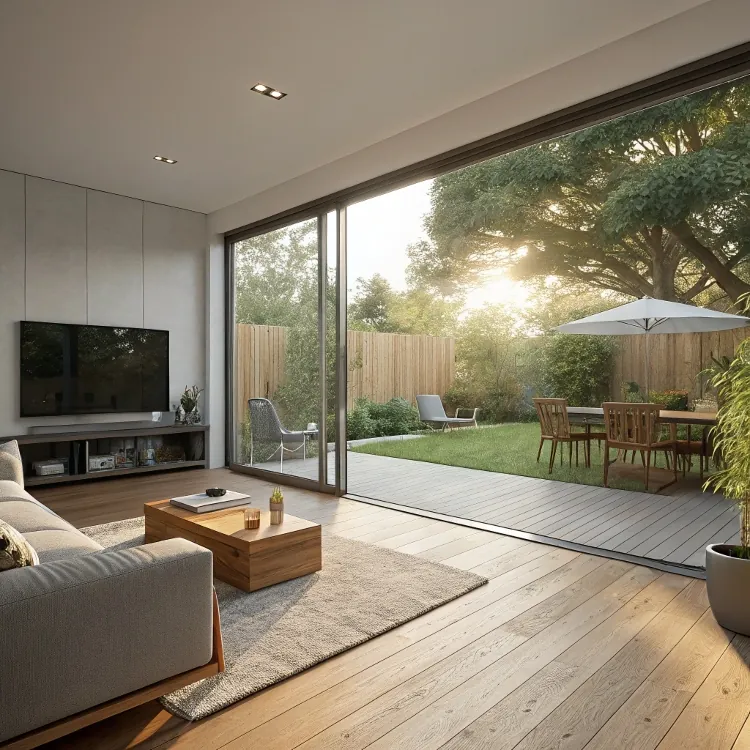
Glass doors shape our living spaces. We often overlook their impact. But door type matters for style, light, and function.
Main glass door types include sliding, bifold/accordion, hinged, and pivot. Each has unique traits for design, insulation, and security.
These door types can enhance space, efficiency, and safety. Let’s look at each in detail.
What advantages do sliding glass doors offer?
Sliding glass doors glide on tracks. They are popular in modern homes and patios.
Sliding doors save space and bring wide views and natural light. They open fully without swinging into rooms.
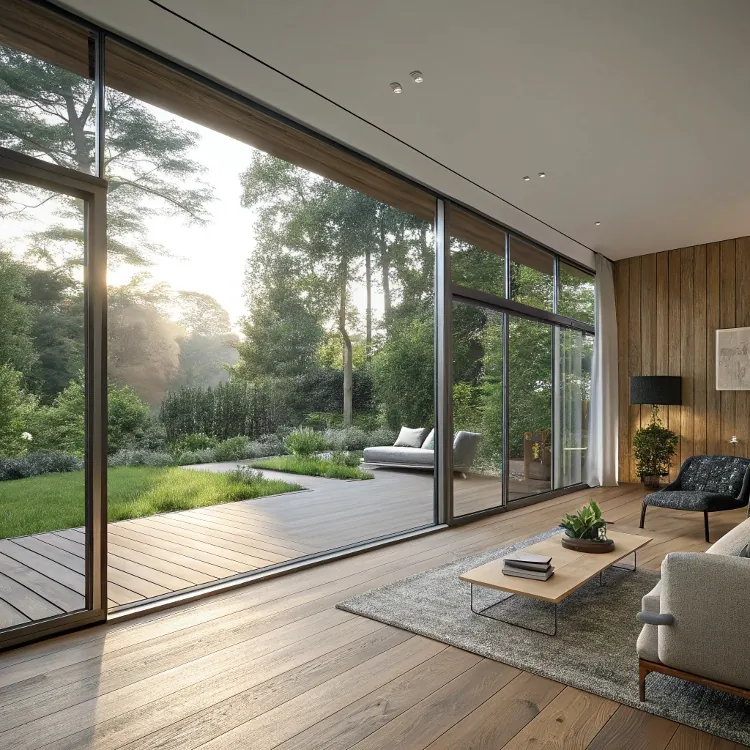
Space efficiency
They slide parallel to the wall. This means no swing space is needed. Great for tight areas or narrow patios.
Large glass area
Sliding doors often come in panels of 6–12 feet wide. This creates wide views and lets in lots of daylight.
Ease of use
They roll smoothly on rollers. Many come with soft-close systems. Kids and elders find them easy to use.
Energy options
Modern sliding doors can include double or triple insulated glass. They may have low-E coatings and thermal breaks in frames.
Security features
They include multi-point locks, strong tracks, and tougher laminated glass for safety.
Summary of benefits: space-saving, wide view, user friendly, energy wise, and secure.
Sliding glass doors are space-saving.True
They slide along tracks and do not swing into the room.
Sliding doors always cost more than hinged doors.False
Cost depends on size, materials, and insulation, not just type.
How do bifold and accordion glass doors differ?
Bifold and accordion doors both fold open to reveal large openings. But their folding styles differ.
Bifold doors fold in pairs and stack to one side. Accordion doors fold in multiple panels and stack like a concertina.
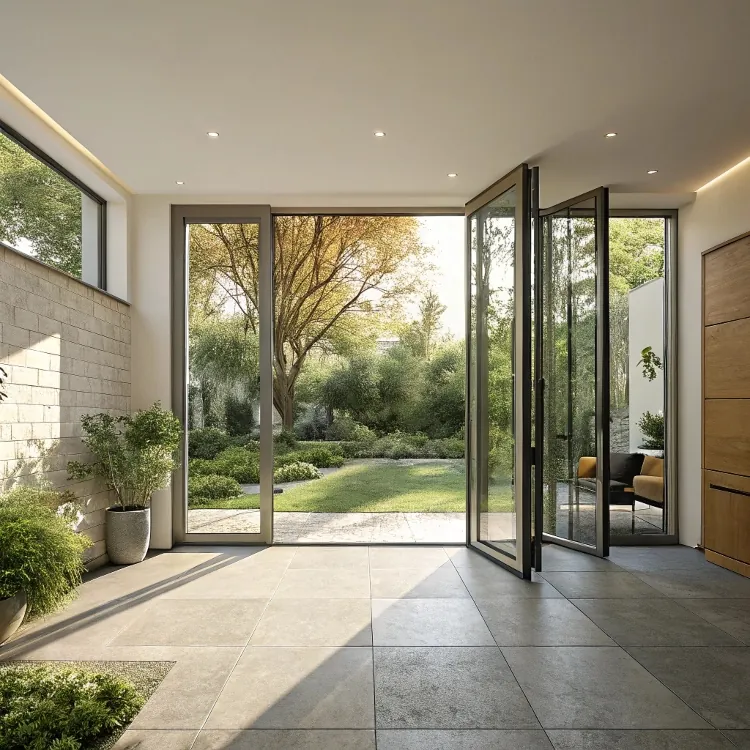
Folding mechanics
- Bifold: Doors are hinged in pairs. They fold neatly to one or both sides.
- Accordion: Doors have many panels. They fold closely together in an accordion style.
Opening width
Accordions can span entire walls. Bifolds often open partially, leaving some glass panels fixed.
Seal and insulation
Bifolds tend to seal tighter due to fewer joints. Accordions have more hinges and seals, which may slightly reduce insulation.
Style and flexibility
Accordions create full open expanses and flexible configurations. Bifolds offer a cleaner look with fewer joints.
Installation and cost
Accordions require stronger headers and tracks across the whole opening. Bifolds need less heavy-duty framing but still need care. Accordions often cost more due to extra hardware and installation complexity.
Use bifolds when you want a balance of open space and insulation. Choose accordions for full wall openings and maximum flow from indoor to outdoor.
Accordion doors can open an entire wall.True
They fold multiple panels fully to one side.
Bifold doors always seal better than accordion doors.False
seals depend on quality and installation, not just type.
What are the features of hinged and pivot glass doors?
Hinged and pivot glass doors both swing open. Their hinge style changes how they operate and look.
Hinged doors use side hinges like normal doors. Pivot doors use pivot points, often at top and bottom or offset.
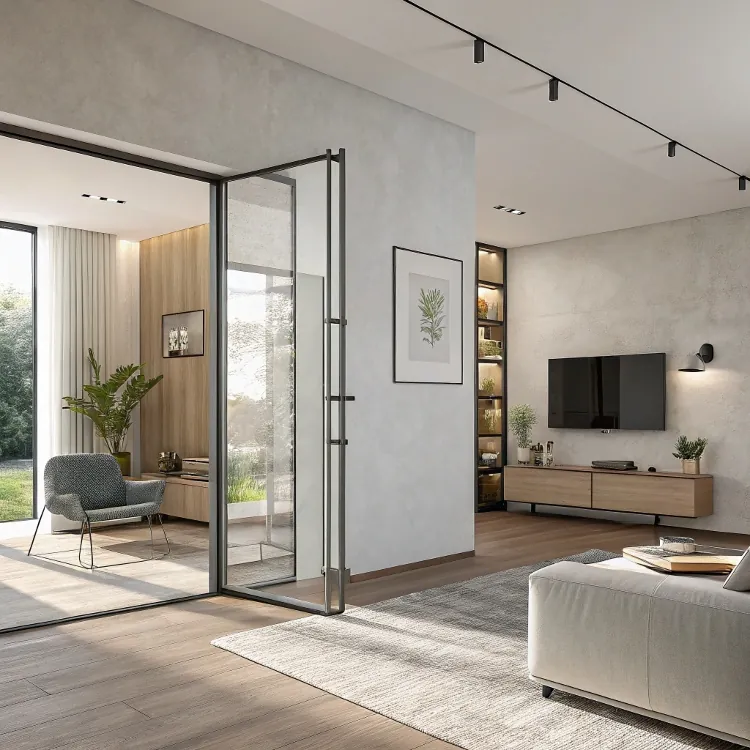
Standard hinged doors
- Swing inward or outward on side hinges
- Typical width is 30–48 inches
- Can include heavy-duty frames for sturdy glass
- Good seal with weather-stripping and thresholds
Pivot doors
- Pivot at top and bottom plates
- Can be offset from center for a dramatic look
- Allow very large or heavy panels, even custom sizes
- Need strong framing to support weight and pivot hardware
Use cases
Hinged doors are practical for rooms, closets, and patios. Pivot doors are often used for grand entrances, showrooms, or modern designs.
Energy and security
Both types can have insulated glass and tight seals. Pivot doors may need extra care to prevent sagging. Hardware is heavy-duty and can support high-end locks and security systems.
Style differences
- Hinged doors feel familiar and practical
- Pivot doors feel dramatic and modern
Choose hinged doors for everyday use. Pick pivot doors for statement entries or high-traffic public areas.
Pivot doors can support larger glass panels.True
Pivot hardware allows heavy and oversized doors.
Hinged doors cannot be insulated.False
Hinged doors can include insulated glass and weather stripping.
Which glass door types offer best insulation and security?
Insulation and security depend on glass, frame, and hardware rather than the door type alone. Still, some types are stronger.
Best insulation and security often come with multi-pane, laminated glass and tight-sealing frames with good locks. Bifold and sliding doors with multi-point locking offer strong performance. Pivot doors with heavy duty panels can also be very secure.
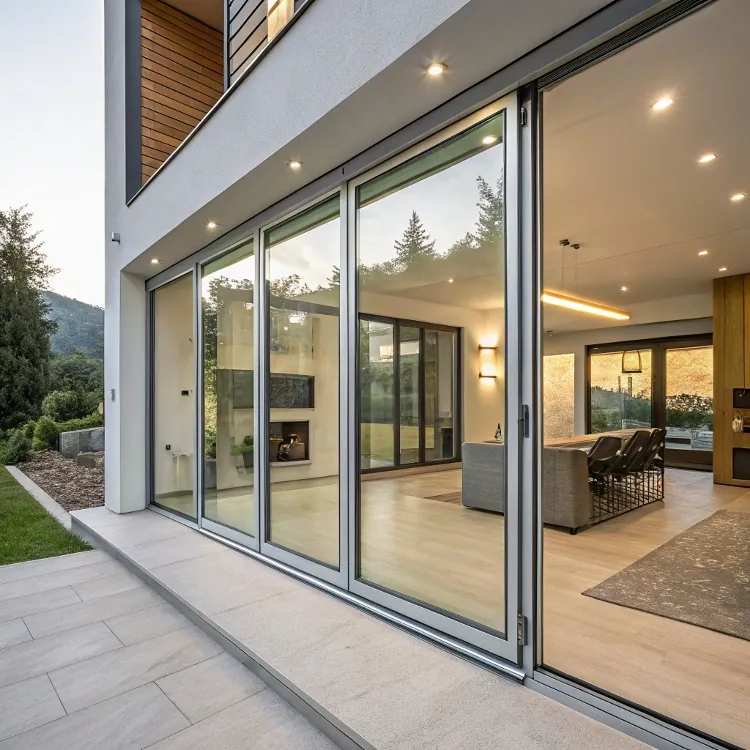
Glass and frame features
- Double/triple glazing: Multiple glass layers trap air or gas for insulation.
- Low-E coatings: Reflect heat and UV to improve energy efficiency.
- Laminated/tempered glass: Resists break-ins and adds safety.
- Thermal break frames: Frame profiles that reduce heat transfer.
Security hardware
Doors with multi-point locking bolts are much harder to force open. Strong tracks and hinges resist attacks.
Type-specific notes
- Sliding: Add security bars and quality rollers. Multi-point locks help.
- Bifold/Accordion: Use secure hinge hardware and locking bolt systems. Fewer panels mean fewer weak points.
- Hinged: Heavy-duty hinges, strong frames, and keyed cylinder locks make them secure.
- Pivot: Doors can be very robust. Secure pivot pins and oversized panels are strong. Locks can be multi-point or deadbolt.
Best performers
| Door Type | Insulation Potential | Security Potential | Notes |
|---|---|---|---|
| Sliding | Medium–High | Medium–High | Needs quality frames and locks |
| Bifold | High | High | Few panels help seal and lock tightly |
| Accordion | Medium–High | Medium | Many joints may reduce seal unless top quality |
| Hinged | High | High | Good seals and standard locks |
| Pivot | High | High | Large panels and quality pivots add strength |
Choose glass doors with certified glass ratings, insulated frames, and secure hardware to meet energy and safety needs. Type matters, but materials and installation count more.
Multi-point locking enhances security for glass doors.True
It secures door at several points, harder to force open.
Accordion doors always insulate better than hinged doors.False
Insulation depends on glass quality, seals, and frame, not just style.
Conclusion
Choose the glass door type that fits your space, style, and use. Sliding doors save space and offer wide views. Bifold and accordion doors open wide for flow but vary in sealing quality. Hinged doors are classic and practical. Pivot doors make a strong visual statement. For top insulation and security, focus on multi-pane glass, tight seals, and strong locks. Measure well, select quality hardware, and match your needs.



